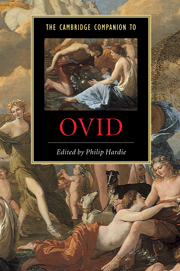16 - Ovid in the Middle Ages
authority and poetry
from Part 3 - Reception
Published online by Cambridge University Press: 28 May 2006
Summary
Ovid in the Middle Ages is an auctor perpetually falling foul of authority. As auctor he is more than an author in the modern sense: he is 'a man of gret auctorite' (Chaucer’s phrase), learned in moral philosophy, natural science and philosophy, as well as the unchallenged expert on love and the most important resource for students of classical mythology. Nonetheless, carmen continues to be coupled with error throughout his medieval reception; however culturally central he becomes, he is never fully restored from his Augustan exile, and remains an archpriest of transgression, whether sexual, political or theological. It is in this powerfully ambivalent role of the auctor at odds with auctoritas, just as much as (and indeed inseparable from) his expertise on mythology and sexuality, that he is most precious to the poets. This chapter will explore a selection of medieval readers and reinventors of Ovid to reconstruct some of the personal and more institutional agendas that the reading of his works could generate, in both secular and religious discourses.
A small, unassuming passage of seemingly-incidental description can serve as our jumping-off point. It is deployed by the twelfth-century poet Marie de France in the lai of ‘Guigemar’, the first in a collection of short French narratives purporting to be drawn from oral Breton tradition; it serves at once to signal Ovid’s presence in the lai and to dramatize his repudiation.
- Type
- Chapter
- Information
- The Cambridge Companion to Ovid , pp. 264 - 287Publisher: Cambridge University PressPrint publication year: 2002
- 11
- Cited by



